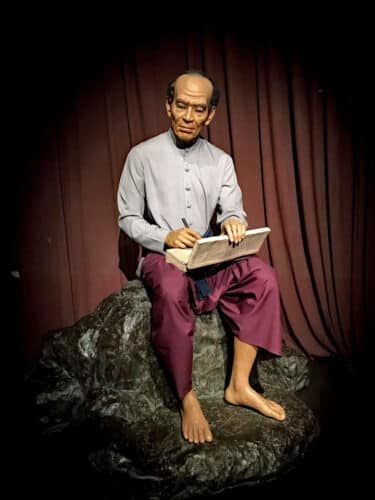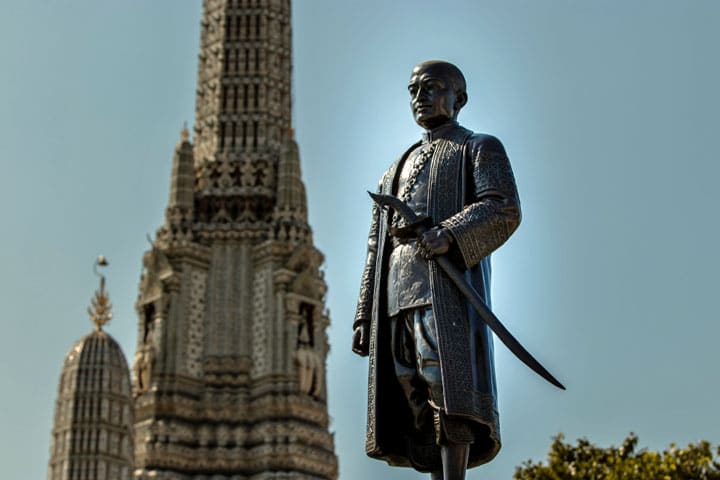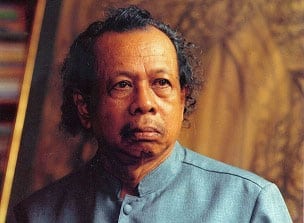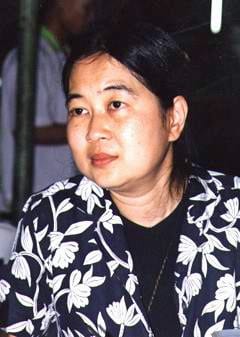Thailand… to get poetic about…

Phra Sunthonwohan (1786-1855) Sunthorn Phu (zomincere / Shutterstock.com)
Over the years I have found that we farang generally not really familiar with the literature, let alone the poetry of our host country. Expats who want to integrate generally have a more thorough knowledge of, say, the local range of food, drink or women than of what is generally described as 'higher' culture.
Highly understandable but still a bit of a shame because I wholeheartedly share the opinion of the Dutch poet Willem Kloos who once, in an unguarded moment, wrote:Poetry is the most individual expression of the most individual emotion”. That the Flemish writer Raymond Brulez immediately put this into perspective with the winged words “Poetry is often the most banal expression of the most absurd confusion of mindsI leave it entirely to his account. So if you were still hungry for more or deeper cultural insight, I have listed for you today a highly personal and therefore subjective selection of some of the most influential Siamese and Thai poets.
I have tried to introduce a certain chronology as a common thread and I therefore start with the poetic soul that can be situated furthest in the past, one Si Prat (1652-1683). He was a typical example of the poets of the Ayutthaya period. The intellectuals were then mainly, not to say only, to be found in the monasteries and palaces. The common people were mostly illiterate and so it was logical that quite a few aristocrats were counted among the most famous poets in the country, because they belonged to the small group who were sufficiently literate to produce poetry. Siamese poetry was real in those days, to quote the Dutch poet Edgar du Perron: “…naked and uncurched, a time abode for some fine people”. Poetry was important and the most practiced form of literature in the Sukhothai (13e in 14. e century) and Auyutthaya (14e all 18e century) – eras. Prose existed only in the form of fables and fairy tales and only made its appearance as a literary form in Siam as a Western import under the reign of Rama IV (1851-1868). Under King Vajiravudh, who ruled from 1910 to 1925 and wrote poems, plays and prose himself, Siamese poetry experienced a revival and grew into the popular genre it is today in Thailand.
Si Prat is a figure shrouded in mystery and, according to some contemporary literary historians, he may never have existed at all. According to myths, he lived in the court of King Narai (1633-1688), the greatest monarch of the Prasat Thong dynasty, as the son of Phra Horathibodi, a respected court astrologer and royal tutor who also wrote poems. The work attributed to Si Prat belongs to the pinnacle of what is known as the Golden Age of Siamese literature. He would deliver the very successful epic at court Anurit Kham Chan (the Narration of Anurit), but his days were numbered when he was found to have engaged in carnal relations with Thao Si Chulalak, one of Narai's favorite concubines. This could have cost him his head, but it is said that the king, out of respect for Horathibodi, spared Si Prat's life and exiled him far south to Nakhon Si Thammarat. On his way to this location he would find his masterpiece, the Lamentation Kamsuan Samut have written. In Nakhon Si Thammarat, he waded closer to the governor's residence. In 1683, when Si Prat was thirty-one years old, he was caught again, this time in the bed of one of the my us, the concubines of the governor, who promptly had him executed. Legend has it that when Si Prat was tied to the execution stake, he quickly wrote a poem in the sand with his foot, which at the same time contained a curse; he who executed him with the sword would himself perish by the sword. Guess what happened next. When a few months later Narai, who intended to pardon his favorite poet and return him to Ayutthaya, learned that Si Prat had died in such a way, he became furious and left his turn beheading the horned governor.
The second poet in line is Prince Thammathibet Chaiyachet Suriyawong or Prince Narathibet, as he is usually known. He was the eldest son of King Borommakot of Ayutthaya and Princess Aphainuchit. Narathibet, who was one of his father's favorites and had been appointed viceroy by him, profiled himself as a sweet-spoken bard who was best known for his poetic outpourings of natural and feminine beauty. It was this beautiful woman who – like his predecessor Si Prat – proved fatal for he had apparently cast a little too greedy eye on some of his father's concubines. He was caught in flagrante delicto with one of them in the royal palace. Borommakot may have overlooked this, but when some of his jealous half-brothers came trotting along with all kinds of conspiracy theories, his fate was sealed. In the torture chamber, he confessed to no fewer than four of the royal concubines' nightly visits and his plans to assassinate the king. The prince-poet, like the four unfaithful concubines and a few high courtiers who are said to have been involved in the conspiracy, did not survive the torture.

King Rama II monument located in front of Wat Arun Temple, Arun Temple (Temple of Dawn).
King Rama II, (1768-1824) was not only a zealous patron of the arts who promoted the arts, but also wrote, wrote and composed quite a bit himself. He considered himself the engine of Siam's cultural renaissance and favored talented poets such as Phra Sunthonwohan. Much of the Siamese poetry had been lost in 1767 when the Burmese razed Ayutthaya to the ground and Rama II was keen to make amends as quickly as possible. He is known to have written a version of the Ramayana/Ramakien, with or without the help of third parties, and to have revived a number of older poems and fables from the Ayutthaya period by reworking and modernizing them. Rama II also stimulated his sons Jessadabodindra and Paramanuchitchinorot to write poems. Prince Paramanuchit or Prince Vasukri as he was often called later became one Sangharaj – the Supreme Patriarch of Buddhism in Siam – who became known for the literary quality of his religious and spiritual writings. Although he also did not shy away from more worldly themes, witness his epic about how King Naresuan hacked the Burmese at Suphanburi in the sixteenth century.
Phra Sunthonwohan (1786-1855) who in civilian life officially went through life as Sunthorn Phu, was also and perhaps not without reason the Drunken Monk' named. He was a court poet in the Rattanakosin era and has the literary-historical status of a Bilderdijk or a Gezelle in the Low Countries. His career as a court poet began under the reign of Rama II, who also indulged in fine poetry. When he died in the summer of 1824, Phu retired to the monastery. Twenty years later he returned to the court of Rama III as a royal scribe and this time remained there until his death. Phu was renowned for his masterly use of language and epic – if perhaps a little too baroque and bloated today – poetry. are among his most famous works Nirat Phukhao Thong, a series of poems recounting a memorable journey to the Golden Mountain, Nirat Suphan about his trip to Suphanburi and the Phra Aphai Mani-saga. His oeuvre is still read today and has inspired musicians, cartoonists and film directors in recent years. The importance of his work was recognized in 1986 on the occasion of his 200e year of birth internationally recognized when he was included by UNESCO in the Hall of Fame of the World Poets.

Angarn Kalayanapong (1926-2012) Photo: Wikipedia
Angarn Kalayanapong (1926-2012) is regarded not only as one of the best Thai poets of the twentieth century, but also as one of the most important painters of his generation. This plastic artist from Nakhon Si Thammarat made his debut with poetry in his student days and became a professional writer in the late 1972s. This certainly did not go smoothly in the first years. Because he experimented with language and deliberately deviated from the traditional Thai rhyme schemes and rules, he initially had to deal with quite a bit of criticism from conservative corners. However, this did not prevent him from XNUMX the Outstanding Poet of the Year Award of Sathirakoses Foundation got. In 1986 he was awarded the Southeast Asian Writers Award for his poem Panithan Kawi. Three years later he received the National Artist Awards in the literature category. He was, not entirely unjustly, seen as a literary innovator. Much of his poetry is characterized by his love of nature and his fear of impending environmental disasters. One of his most famous poems is Lamnam Phu Kradong, an ode to the eponymous National Park in Loe. In 2006, he came into the public eye one last time for openly expressing his support for the resistance of the 'yellow shirts' of the People's Alliance for Democracy (PAD) against the government of Prime Minister Thaksin Shinawatra. Angarn Kalayanapong, who was a diabetic, passed away at the age of 86 at Samitivej Hospital in Bangkok after heart failure. The Nation wrote about him the day after his death that he "poetry breathed".
Chit Phumisak (1930-1966) is an outsider. This philologist, historian and writer was also a songwriter, poet and communist agitator whose combative poems called for solidarity with the downtrodden in the Land of Smiles. The latter was not much appreciated by the ultra-conservative ruler, General Sarit Thanarat, and cost him a six-year prison sentence in 1957. In 1965, when Phumisak had effectively joined the ranks of the illegal Thai communist party, he went into hiding in the jungle, but on May 5, 1966 he was killed near Nong Kung village in Sakhin Nakhon.

anchan
Anchalee Vivatanachai (°1952) who uses the pseudonym Anchan, was born in Thonburi and is an academically trained writer who has a Bachelor of Arts degree in Thai literature and linguistics from Chulalongkorn University. After graduating she moved to New York where her parents lived and where she trained in the study of gemstones. her debut, Mother Dear from 1985 was immediately enthusiastically received and was named best short story by the Thai PEN club that same year. Five years later, her collection of short stories was published Anmani Haeng Chiwit (The Jewels of Life) awarded a Southeast Asian Writers Award. Her unconventional and innovative collection of poems Lazy was nominated for another one in 1995 Southeast Asian Writers Award.
Hella S. Haase once stated that poetry is the most honest form of truth. That certainly applies to Chiranan Pitpreecha (°1955). Both Tino Kuis and your servant have already paid attention to her life and work on Thailandblog, which excels through integrity and social involvement. It is therefore no coincidence that she was included in the prestigious Who's Who in Contemporary Women's Writing. This Trang-born activist and feminist, encouraged by her mother, wrote her first poems when she was 13. Together with her husband, she became the student leader and later writer and poet Sexan Prasetkul (°1949) involved in the student revolt in the XNUMXs, and after it was bloodily broken up by the regime, had to go into hiding in the jungle. Her experiences from the period were published in her collection Bai Mai Thi Hai Pai (Het Verloren Blad), who was awarded the 1989 Southeast Asian Writers Award.
The poet Saksiri Meesomsueb (°1957) from Nakhon Sawan usually uses the pseudonym Kittisak. He reportedly wrote as a child, but like Angarn Kalayanapong, he first began publishing poems while studying fine arts in Bangkok between 1972 and 1976. Since then he developed into a popular poet, writer, songwriter, columnist, critic and painter. In 1992 he received the Southeast Asian Writers Award for his collection of poems The Hand is White. For his literary work, in which he does not shy away from more charged themes such as environmental issues, social oppression, capitalism and religion, he was awarded the Mekong River Literary Award in 2001 and in 2005 he was awarded the Silpathorn Award for Literature the is awarded by the Thai Ministry of Culture.
Paiwarin Khao Ngam (°1961) was born in Roi-Et in Isaan and profiled himself as a socially committed writer and poet. His poetic debut There's no Poem for a Poor Man rolled off the press in 1979. Since then he has been publishing as regularly as clockwork and this diligence was rewarded in 1995 with a Southeast Asian Writers Award for his collection of poems Banana Tree Horse.
If, after plowing through all this poetic violence, you still want to find solace in a comforting thought, I have, by way of conclusion, this deep thought from Herman Finkers for you: “Poetry, not that difficult, something rhymes with everything. Except for water bike, nothing rhymes with water bike “…


The accessibility of Thai poetry is of course very limited for us. For many of us, we hardly speak the language or speak it to a limited extent, and we can read and write even less. At least that applies to me. To penetrate poetry requires an even greater knowledge of the language in order to understand the many metaphors and symbolisms that often appear in it.
“I have found over the years that we Farang are generally not very familiar with the literature, let alone the poetry of our host country. Expats who want to integrate generally have a more thorough knowledge of, say, the local range of food, drink or women than of what is generally described as 'higher' culture.”
It sounds like a reproach, but how many Thai women who live permanently in the Netherlands have knowledge of Dutch literature (from Multatuli to Wolkers) or poetry. Apart from the fact that many Thais are not aware of their own literature, if only because the vast majority of Thais do not belong to the 'higher culture' and have never completed high school with the corresponding quality .
Hi Chris,
remains of right… This introduction was doused with a touch of irony.. Despite the existence of a literary canon or attainment targets in education, most Flemish and Dutch people have no idea about their poets and writers, let alone that they could quote… .
Virgin's blood, that must flow, for the benefit of mankind and for the sputum of eternal posterity...
Quote:
'Apart from the fact that many Thais are not aware of their own literature, if only because the vast majority of Thais do not belong to the 'higher culture' and have never completed secondary school with the associated quality. run through.'
Gee, how do you know all that, chris? I tell you that many Thais are reasonably aware of a lot of Thai literature and are also presented with it at school. I want to bet you that more Thais know the epic Khun Chang Khun Phaen and can recite parts of it than the Dutch are familiar with Multatuli. I have talked to taxi drivers about it. Ah, and many know a few poems by Chiranan and the 'communist' Chit Phumisak by heart.
dear Ti,
You have lived in a different Thailand than I do now. In Chiang Mai you only met literate Thais (the house full of books), critical Thais and Thais who sympathized greatly with the red shirts, with Thaksin and Yingluck. They probably not only knew Communist poems by heart, but also knew the Internationale better than the national anthem.
I live among the Thais who either work hard or have no work and for whom every day is a struggle. They have very little with red, with yellow, but are completely absorbed in the worries of everyday life, with a beer at the end of the evening.
In my work I encounter the literate but uncritical students and teachers who are mostly apolitical, or against the red mob, and who know more about English literature than about Thai (with the exception of the glorifications of the Thai nation and all the wars won with the help of a king) because one attended an international school and/or studied and/or worked abroad.
I would like you to take off your red glasses and admit that there is still a long way to go for a mature nation with positively critical citizens (critical of yellow, critical of red) who know their rights but also their responsibilities. And in my opinion that has a lot to do with social and economic inequality and not with the constitution and article 112. The consequences of Corona put the country back at least 20 years in time.
Quote:
'….admits that there is still a long way to go for a mature nation with positively critical citizens (critical of yellow, critical of red) who know their rights but also their responsibilities. And I think that has a lot to do with social and economic inequality…”
I took off my red glasses for a moment. What the quote says is true, Chris, and I fully admit it, but we were talking about literary knowledge. What does that have to do with red and yellow, with Thaksin and Yingluck? Or with article 112 and the constitution? You're dragging your feet with that.
Regardless of the image that the government of any country tries to give itself, it is the day-to-day contacts with the population that will determine the effective perception.
And I think that the vast majority of foreigners who visit Thailand mainly come into contact with people who (for economic reasons) mainly use Thai "assets" such as easily and anonymously accessible paid sex, bacchanalian excesses, allegedly limited social control (supposedly because Thais conceal their true feelings) etc. preach.
An elite may develop or maintain contacts with Thais who represent “higher” cultural and other “values”.
But an elite is by definition a minority. And in a class society like Thailand it is extremely prominent, especially.
Color
Chris, one more time. I personally took extracurricular Thai education and have two diplomas. I also followed my son's efforts in this and read his textbooks. Literature is given a reasonable amount of attention in all Thai schools. I have a lot of Thai literature in my bookcase. Some books have dozens of reprints. Literature is also regularly discussed in various media. All in Thai. I think the 'whataboutism', how it is in other countries, is superfluous.
Thank you for bringing up this topic, Lung Jan. It is the language and the literature that give us the best knowledge about a country and a culture. Much has been translated into English and Botan's book 'Letters from Thailand' has also been translated into Dutch. Come on, go read!
Let me mention perhaps the most famous work in Thai literature: the epic Khun Chang Khun Phaen. It dates back to the 17th century, conceived, orally transmitted and performed by the 'common' people with a royal addition from the early 20th century: Rama II and II indeed. I'm in the process of writing more about that.
https://www.thailandblog.nl/cultuur/khun-chang-khun-phaen-het-meest-beroemde-epos-thaise-literatuur/
There are more stories in the left column Subjects / Culture Literature. Let me take out three that you also mention.
Anchalee Vivatanachai The Story 'The Beggars'
https://www.thailandblog.nl/cultuur/bedelaars-kort-verhaal/
Chit Phumisak His poem and song 'Starlight of Determination'
https://www.thailandblog.nl/achtergrond/jit-phumisak-dichter-intellectueel-revolutionair/
And the poems of Chiranan Pitpreecha with English and Dutch texts
https://www.thailandblog.nl/politiek/thaise-poezie-geboren-politieke-strijd-1/
https://www.thailandblog.nl/achtergrond/chiranan-pitpreecha-de-ziel-houdt-stand/
The poem 'The Flowers Shall Bloom' is also a song Dogmai ja job:
https://www.youtube.com/watch?v=–Mx5ldSx28
This last song and the song 'Sterrelicht van Vastberadenheid' are often sung at the current demonstrations of pupils and students.
'Starlight of Determination':
https://www.youtube.com/watch?v=QVbTzDlwVHw
Are there also poems by a Thai Herman Finkers? I want to read that one!
Thailand is known for rote learning at school, as far as I know Thai literature is also put in nicely. (However, I don't think forced stomping is conducive to promoting reading of literature once children have finished school…). I would be surprised if well-known literature such as Khun Chang Kun Phaen, or well-known writers (if not seen as a communist threat or troublemaker) is not hammered into the children. Some of that will stick.
By the way, I didn't have Multatuli at my school, but I did see it discussed in the media outside of school. A Wolkers (or similar) was compulsory at school.
Reading some literature from your second home country can't hurt. I'm almost through Khun Chang Khun Phaen. Good to know that in the good old days when a man slept with a woman it practically meant that one was married from then on. The woman was the man's property and had to listen to her husband.
Chris, one more time. I personally took extracurricular Thai education and have two diplomas. I also followed my son's efforts in this and read his textbooks. Literature is given a reasonable amount of attention in all Thai schools. I have a lot of Thai literature in my bookcase. Some books have dozens of reprints. Literature is also regularly discussed in various media. All in Thai. I think the 'whataboutism', how it is in other countries, is superfluous.
Lung Jan,
Just this quote:
'The common people were mostly illiterate and therefore it was logical that quite a few aristocrats were counted among the most famous poets in the country, because they belonged to the small group who were sufficiently literate to produce poetry.'
That doesn't quite make sense. I think there were many illiterate poets who often passed on their poetry orally, but which was often not written down or only much later. This was the case, for example, with the well-known epic Kun Chang Khun Phaen, which originated in the 16th and 17th centuries and was only written down in the middle of the 19th century. Even an illiterate person can produce poetry, and I wouldn't be surprised if many aristocrats took some of their written poetry from the people. Poetry and writing are not identical. This also applies to the Middle East, to name but a few.